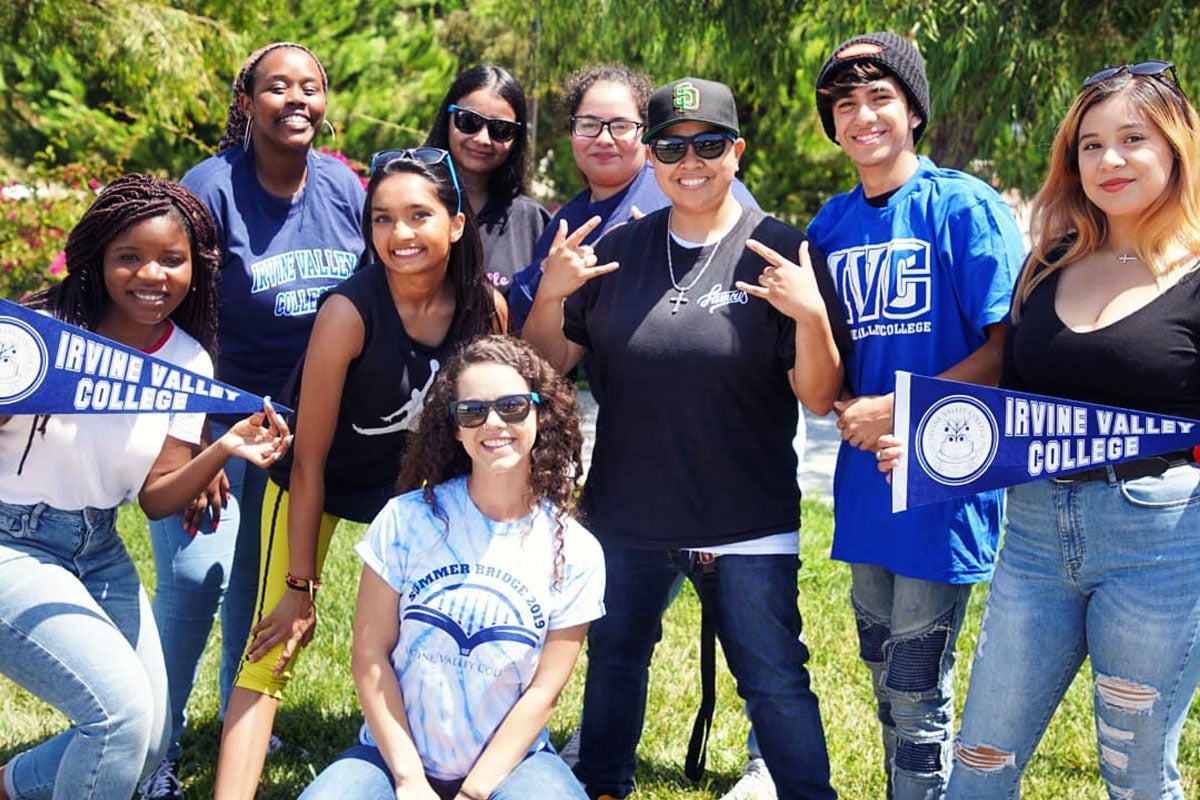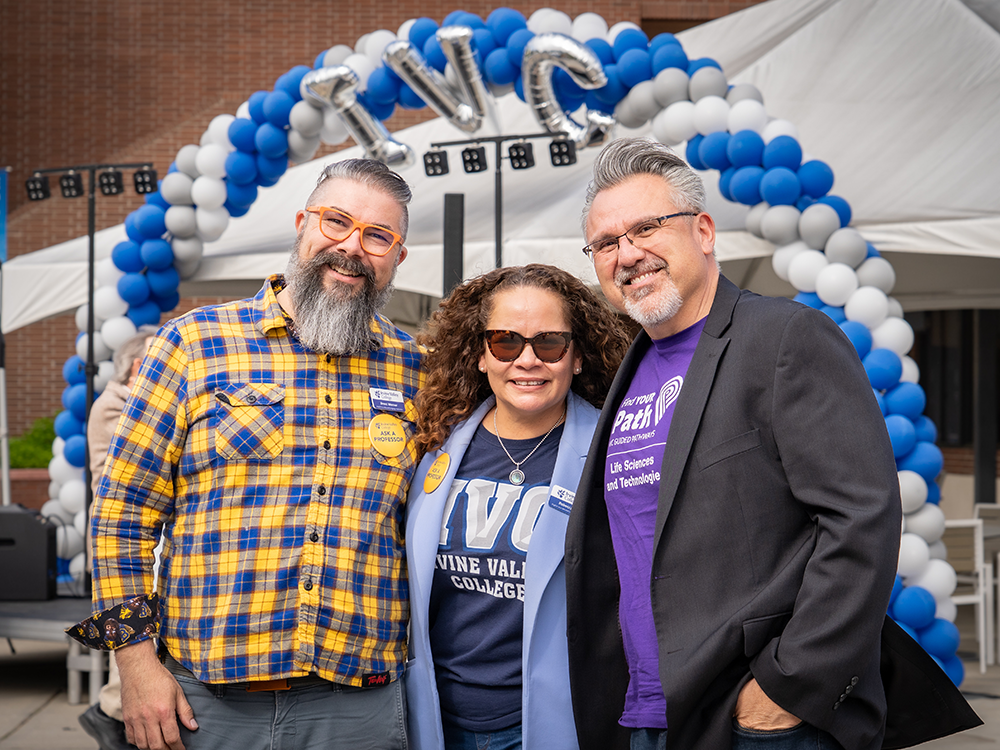Article I: Name
The name of this organization shall be the Irvine Valley College Classified Senate (IVCCS).
Article II: Mission/Purpose
The Classified Senate shall represent classified employees in the Irvine Valley College governance system and is intended to provide:
- A body representing the various opinions, needs, concerns, and viewpoints of the bargaining unit employees in all aspects of participatory governance and decision-making at the South Orange County Community College District (SOCCCD) as it pertains to Irvine Valley College on matters that are not related to collective bargaining, contract negotiations, working conditions, and other legal related areas as addressed by the California School Employees Association (CSEA).
- A means through which classified professionals will coordinate and collaborate with administration and faculty to provide equitable opportunities for participation in governance regarding college business and classified representation on college and district-wide committees.
- A body through which the professionalism of classified employees is articulated, valued and respected.
- A means for enhancing the democratic process of informed decision-making.
- An opportunity to develop individual leadership and professional development initiatives.
Article III: Membership and Responsibilities
Section 1: Membership
The Classified Senate shall consist of all permanent full-time and part-time classified bargaining unit employees.
Section 2: Responsibilities
The Classified Senate shall:
- Appoint all Irvine Valley College Classified Senate representatives on all Classified Senate, college, and district wide committees as needed, including but not limited to hiring and strategic planning committees.
- Collect, evaluate, and disseminate information of interest to classified professionals.
- Review all policies affecting classified professionals and provide feedback to those tasked with creation and implementation, with the exception of those policies relating to the scope of CSEA.
- Respond to queries and/or requests on behalf of the classified employees.
Section 3: Rights
- The Classified Senate shall retain the right to request and obtain information and/or recommendations made by the college administration to the Board of Trustees in time to effectively consider the issues in those recommendations.
- The Classified Senate shall retain the right to select a member to appear before the Board of Trustees to express the views of the Classified Senate.
- The Classified Senate is empowered to establish policies, make recommendations, and take action for classified professionals, not relating to the scope of CSEA.
Article IV: Officers, Senators, Electorate and Elections
Section 1: Officers
- The governing body of the Classified Senate shall be elected by members of the classified bargaining unit and will consist of the following officer positions, also referred to as the cabinet:
- President
- President-Elect
- Vice President of Equity
- Treasurer
- Recorder or Secretary
- Webmaster
- Past-President
- Prior to nominations for the upcoming year, the cabinet may decide to combine positions to meet the current needs of the Classified Senate. Once nominations for positions has opened, any changes must be supported by a majority of voting members.
- The officers of the Classified Senate shall be permanent full-time classified employees. The term of office for each of the above positions shall be two years, from July 1 through June 30 of the subsequent year. All officers shall assume their duties on July 1.
Section 2: Senators
- Area Senators who represent specific areas of the campus community shall be nominated and elected by members of the classified bargaining unit.
- The senators of the Classified Senate shall be permanent classified employees. The term of office for each of the above positions shall be two years, from July 1 through June 30 of the subsequent year. All senators shall assume their duties on July 1.
Section 3: Electorate
Those eligible to vote in an election include those eligible for membership in the Classified Senate (Article III, Section 1).
Section 4: Election Process
- Elections will take place every two years, on odd numbered years.
- The Nominating Committee shall solicit names of candidates and shall supervise the election process.
- The announcement of nominations for all offices, except the positions of President and Past President, shall be held at the March Classified Senate meeting and the nominating process shall take place at the April Classified Senate meeting and/or via an electronic nominating process.
- If, after nominations are closed there is only one nomination for an office, the nominee shall be declared elected to the office, and no balloting or other action shall be required.
- When there is more than one nominee for an office, an election shall be conducted by a secret ballot vote of eligible members. A simple majority of ballots cast will be required to elect an officer or committee member. Nominees will be allowed to make a statement regarding their candidacy at the May Classified Senate meeting prior to the election.
- After the election process has completed, the Nominating Committee shall notify the current President of the results, who will notify the membership of the election results via email. The outcome of the election will also be communicated by posting the results to Classified Senate website and will be announced at the June general Classified Senate meeting.
- Notice of nominations and election procedures and all other procedural matters relating to conducting elections shall be as follows and in accordance with the following:
- The time and method of submitting nominations shall be provided to all members at the March Classified Senate meeting and shall include the positions to be filled and the timeline and place for submitting nominations.
- The time and method of elections shall be provided to all members at least ten (10) working days prior to the time of elections. Elections shall be held in a manner that ensures accessibility to all voting members in consideration of their respective schedules from noon until 6:00pm on a day designated by the Nominating Committee.
- All positions shall be elected by a majority of the votes cast by the membership of the Classified Senate.
- Elections shall be conducted by secret ballot, either by paper or electronic ballot. Proxy votes shall not be permitted.
- The Nominating Committee shall certify the vote tally and deliver copies to the President. The report shall include: The total number of votes cast and the number of votes each candidate received.
- All ballots, tally sheets, voting log sheets and related documents shall be secured and retained by the Nominating Committee Chair or Senate Secretary until any objections to the election have been resolved.
- The Nominating Committee election report shall be published via email to all classified members and shall also be announced at the next Classified Senate meeting.
- Any member may file a complaint relating to the conduct of the elections which alleges violations of these procedures, or alleges other conduct or activities relating to the election which may have affected the outcome of the elections.
- Such complaints must be filed with the President within (5) five working days following the close of the election and shall be in written form, specifying the procedures violated or the objectionable conduct, and specifying how such violations and/or conduct may have affected the outcome of the election. The complainant shall be afforded due process.
Section 4: Special Elections and Appointments
- A vacancy may occur through resignation, leave of absence, or by declaration. Such vacancy shall be filled by an appointment made by the Senate executive officers until the next regular election, at which time nominees will be solicited to fill the remaining term.
- Any officer may be recalled at any time by any member of the classified senate by submitting in writing to the President a request for a special meeting and hearing to discuss the matter. In the event the officer to be recalled is the President, written notice must be submitted to the President-elect. Due process shall be provided for any recall.
- In the case that immediate past president is no longer a classified member of the college, the previous past president shall be appointed to complete the term.
Section 5: Officer’s Terms and Duties
- President
- Term of office shall be for two years, followed by a consecutive two year term as Past President.
- The President shall be the spokesperson for the concerns of the Classified Senate to the Board of Trustees, administration, faculty, and the public.
- The duties of the President shall include, but not be limited to:
- Procuring of information and recommendations being sent to the Board of Trustees by the college and district administration.
- Convening and presiding over Classified Senate general and executive meetings as chairperson. The President shall vote only in the event of a tie.
- Attending the annual IVC Foundation dinner, , with two tickets to be paid from Classified Senate funds.
- The President (or their designee) shall be the official representative of the Classified Senate to Strategic Planning and Accreditation Council (SPAC), the Budget Development and Resource Planning Committee (BDRPC), the Institutional Effectiveness Committee (IEC) and the Student Success, Access, Matriculation, Marketing and Outreach Committee (SSAMMO), the District Chancellor’s Cabinet meetings, Board Policy and Administrative Regulations meetings (BPARC), and any other governance meetings requesting Classified Senate representation.
- Appointing, on the advice of the Officers, Classified Senate members to serve as interim representatives on all committees covered by Article 5, Section 3 until the election process has been completed for such committee positions.
- Calling special Classified Senate meetings when necessary or requested by ten percent (10%) of the Classified Senate Officers or membership-at-large.
- Shall be the liaison for statewide classified senate activities and provide the members with information on statewide concerns.
- Other duties as may be agreed to by the President and the Officers.
- On an as-needed basis, solicit names of classified employees interested in serving on hiring committees and shall forward the names to the Officers for consideration and appointment.
- Mentor the president-elect.
- President-Elect
- Term of office shall be for two years followed by a consecutive two year term as President.
- The President-Elect shall serve as Vice President and assume the duties of the President in the President’s absence.
- The duties of the President-Elect shall include, but not be limited to:
- Keeping the Classified Senate apprised of actions of all committees covered by Article 5, Section 3.
- Attend meetings at the discretion of the President.
- Other duties as may be agreed to by the President-Elect and the Officers.
- Vice President of Equity
- The term of office shall be for two years.
- The duties of the Vice President of Equity shall include, but not be limited to:
- The Vice President of Equity will collaborate with Caring Campus efforts at the college level, including students, classified professionals, faculty, and administrators.
- The Vice President of Equity will serve on the President’s Advisory Council of Diversity, Equity, Inclusion, and Accessibility (PAC-DEIA).
- The Vice President of Equity will provide information and resources to classified professionals on how to implement DEIA efforts at the college.
- The Vice President of Equity will attend and present at DEIA conferences and professional development opportunities to represent the college.
- The Vice President of Equity will be included in workgroups, committees, and councils to become knowledgeable about disproportionately impacted data, specifically regarding IVC students and employees.
- Treasurer
- Term of office shall be for two years.
- The duties of the Treasurer shall include, but not be limited to:
- Receiving all funds of the Classified Senate and keeping and disbursing same under the discretion of the President and as required by the Classified Senate.
- Keeping all financial records which shall be open at all times to the inspection of the President and the Classified Senate.
- Report at each executive and general meeting of the Classified Senate the financial condition of the treasury with a detailed statement of receipts and expenditures and accounts payable.
- Prepare an annual financial report to include the last day of the fiscal year, and provide access to all records, vouchers and statements to the President and the Classified Senate.
- Upon leaving office, sign such bank signature cards or other documents necessary for the transfer of all Classified Senate accounts.
- Other duties as may be agreed to by the President and the Officers.
- Secretary/Recorder
- Term of office shall be for 2 years
- The duties of the Secretary shall include but not be limited to:
- Maintaining, publishing, and distributing the official minutes and attendance records of all Classified Senate General and Officer Meetings.
- Publishing and distributing the agenda of official Classified Senate meetings.
- Maintaining an executive board attendance report and distributing to each Executive Board member after each meeting.
- Webmaster
- Term of office shall be for two years.
- The duties of the Webmaster shall include, but not be limited to:
- Maintaining an active and up-to-date website for the Classified Senate.
- Ensuring that Agendas, Minutes, Calendars, Constitution and Bylaws and other pertinent information for the benefit of the members is posted and available for viewing.
- Coordinating the Classified Senate Website with the Irvine Valley College Website to ensure that governance information is properly published and displayed.
- Other duties as may be agreed to by the President and the Officers.
- Past-President
- Term of office shall be for two years. The office of Past-President may continue additional year(s) if the President continues additional term(s).
- The duties of the Past-President shall include, but not be limited to:
- Assisting the President as needed.
- Attending with the President, the first College Council meeting.
- Attend additional meetings at the discretion of the President.
- Other duties as may be agreed to by the President and the Officers.
- Area Senators
Each of the represented areas shall elect a minimum of one Area Senator. Runner-up for Area Senator will serve as an Alternate. If there is no runner-up, each Area Senator shall appoint one Alternate for her/himself. Areas may request reorganization by written petition of at least ten (10) percent of the Classified from the area(s) to be affected, or by a majority of the Officers, as per Article VI.
- Qualified areas are as follows:
- A-Quad and CEC
- B-Quad
- Library (LIB)
- Maintenance & Operations/Safety/Warehouse
- Performing Arts Center (PAC) and Business Sciences & Technology (BSTIC)
- Student Services Level I
- Student Services Level II
- Advanced Technology & Education Park (ATEP)
- PE Quad
- Term of office shall be for two years.
- The duties of each Area Senator shall include, but not be limited to:
- Attending and actively participating in all general and special meetings of the Classified Senate.
- Communicating between the Classified Senate and their area.
- In the event an Area Senator or elected Alternate cannot attend a meeting they shall send a designee from their area as a representative.
- Senate officers and area senators shall annually review and make recommendations regarding the senate bylaws and constitution.
- Assure that strategic planning committees have Classified Senate representation by serving as a back-up should a committee representative in their area be unable to attend a meeting or secure an alternate, when feasible. If unable, the Senator will serve as liaison with executive officers by notifying the Senate President when committee representation is needed.
- Qualified areas are as follows:
Article V: Governance
Section 1: Meetings
- The officers and senators of the Classified Senate shall meet a minimum of once every two months for an Officer/Senator meeting.
- The Classified Senate shall meet a minimum of once a quarter for general meetings.
- All general and special meetings are open meetings.
- Regular and special meetings shall be held in accordance with the Brown Act.
- All classified bargaining unit employees may vote at all general and special meetings
- Announcements of general and officer meetings shall be publicly posted in accordance with the Brown Act. All special meetings shall be publicly posted a minimum of three (3) working days prior to the meeting.
- A quorum, for purposes of officer meetings, shall consist of a minimum of fifty-one (51%) of the Officers. Decisions will be made by general consensus of members present.
- A quorum, for purposes of all general and special meetings and voting, shall consist of a minimum of seven (7) members present. Decisions will be made by general consensus of members present.
- The President may determine when a balloting of the whole membership instead of those present is warranted for a specific issue; a majority of members present may determine this voting method by requesting such at a general meeting or, in writing or electronically.
- Official minutes of each Classified Senate meeting shall be kept and made available to all members of the Senate, no later than one (1) calendar month following the meeting.
Section 2: Agenda
- The Secretary shall be responsible for publishing and distributing the Agenda to members of the Classified Senate for officer/senator, general, and special meetings.
- Items for the general meeting agenda must be submitted from the membership-at-large to the Secretary no less than five (5) working days preceding the Classified Senate meeting.
Section 3: Committees
The Classified Senate shall establish both permanent and, when appropriate, ad hoc committees to assist in the development and implementation of policies and procedures relating to Classified Senate members and to the operational matters of the college. All committee representatives covered by Article V, Section 3 will be elected in accordance with the procedures used to elect officers. Interim appointments to these positions may be made by the President.
Permanent Committees
Committee Chairs will be a designated officer from the cabinet. Committee Chairs or their designee will attend all General Meetings and provide a report to the general membership.
- Fundraising Committee
This committee oversees and makes recommendations to the Classified Senate for all fundraising activities.- Committee consists of a minimum of three (3) members
- A quorum for purposes of meeting and conducting business shall consist of a minimum of two (2) members of the committee.
- Nominating Committee
This committee oversees the nominations and elections process including the preparation, distribution, counting of the ballots, and certifying of the election results. This committee is responsible for maintaining an updated list of current employees and reports any changes to the Classified Senate.- Committee consists of a minimum of three (3) members.
- A quorum for purposes on meeting and conducting business shall consist of a minimum of two (2) members of the committee
- Scholarship Selection Committee
This committee reviews and selects all qualified applicants for Classified Senate Student Scholarships and makes recommendations to the Classified Senate each year on the amount, number, and criteria for scholarships to be awarded.- Committee consists of a minimum of three (3) members.
- A quorum for purposes of meeting and conducting business shall consist of a minimum of two (2) members of the committee.
- Professional Development Activities Committee
This committee is charged with planning the IVC Classified Staff Development activities and any other staff development activities that would be open to all classified.- Committee consists of three (3) members.
- A quorum for purposes of meeting and conducting business shall consist of a minimum two (2) members of the committee.
- College and District Standing and Ad-Hoc Committees
Classified Senate representatives to these committees will be elected in accordance with the procedures to elect officers.- Classified Senate representatives shall be the committee liaison for the Classified Senate and shall submit a report at the next general meeting; or a written report prior to the meeting.
- Other duties as assigned by the Officers.
Ad Hoc Committees
Ad hoc committees may be established by the President of the Classified Senate. Such committees shall be formed for special purposes and shall be of short duration. Appointments shall be recommended by the President and approved by a simple majority of the Classified Senate.
Article VI: Amendments
- An amendment to the Bylaws of the Classified Senate may be proposed either by a majority of the officers or by a written petition of at least ten (10) percent of the Classified Senate. The officers shall thereupon publicize the proposed amendment to the Classified Senate in writing. After giving members a minimum of ten (10) working days written notice of the date, time, and place thereof, the Classified Senate shall conduct one or more hearings at least ten (10) working days from the date of publication of the proposed amendment, and no more than thirty (30) calendar days after the date of publication. The Senate shall record and publish minutes of the said hearing(s).
- Action on proposed amendments must be taken within ten (10) working days of the final hearing. All actions must be by secret ballot. A majority of the votes cast by the Senate is necessary for an amendment to take effect.
Article VII: Ratification
The procedures for adoption and ratification of these Bylaws shall be the same as those for amending, in that the Bylaws are to be made available to all eligible voters, hearing(s) held, and a vote by general consensus.
Article VIII: Consensus Model
Except as otherwise herein provided, the conduct of meetings and other procedural matters shall be according to general consensus.1
1 In the traditional consensus model, one person has the power to block the decision if they strongly disagree. If the board is unable to create a compromise to satisfy the blocker, they may call for a majority vote as a last resort. This is sometimes known as a “modified consensus”… – Excerpt from Great Boards for Small Groups: A 1-Hour Guide to Governing a Growing Nonprofit.
- Adopted: Revised: Feb 2013
- Revised: Aug 2016
- Adopted v2: Feb 2018
- Adopted v2. Revised: September 19, 2023





